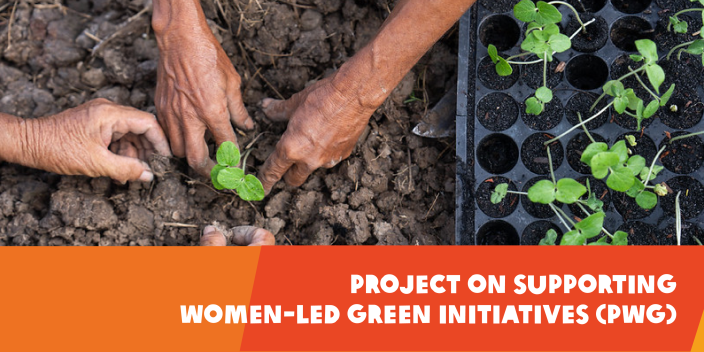Project on Supporting Women-led Green Initiatives (PWG) (2024 - 2029)
What we do
Vietnam is highly vulnerable to climate change and natural disasters, disproportionately impacting women who often lack access to resources and decision-making platforms. Women face barriers in participating in policies and programs related to green growth, climate adaptation, and disaster preparedness.
To address these challenges, Oxfam in Vietnam, supported by the European Union and in partnership with the Women's Unions of selected provinces, is set to launch the Project on Supporting Women-led Green Initiatives (PWG). This initiative is part of the EU - Vietnam Women-led Green Partnership Program, and will be implemented from October 2024 to the end of March 2029.
The project aims to empower women in all their diversity and integrate them into the green and circular economy, by improving access to decent jobs and entrepreneurship opportunities. It will also enhance their participation in decision-making at both national and local levels, facilitating their influence over policies that affect their lives. To this end, PWG will distribute approximately 65 sub-grants to non-state actors and mass organizations in Vietnam. These grants will support initiatives that promote climate resilience, sustainable agriculture, responsible consumption and production practices, disaster preparedness, and gender equality, aiming to make a significant impact on 7-10 million people, particularly vulnerable women and girls.
Where we do it
Lao Cai, Yen Bai, Hue, Quang Nam, and Bac Lieu
What we aim to achieve
Overall aim: Improved access to decent jobs and entrepreneurship opportunities in the green economy and the circular economy for women in all their diversity through:
- Strengthened technical, operational, and networking capacities of gender-responsive and environmentally sensitive organizations to implement initiatives in the field of climate change adaptation and mitigation based on natural solutions, disaster risk reduction, environmental protection, sustainable agriculture, sustainable forestry, responsible consumption and production practices, and gender equality.
- Increased public and private sector financing mechanisms for MSMEs, owned or managed by women, including women’s informal business gender bonds.
Our target in numbers
- Approximately 65 organizations receive grants and demonstrate improvement in capacity
- 1,155 women and girls in all their diversity, involved in the project, employed in the green and circular economy
- At least 33 women-led businesses operating in the green and circular economy create more economic benefits for women and girls
- 10 changes in policy and practice at sub-national levels
- 7-10 million people benefit from increased awareness and greater access to green employment opportunities.
Who is involved
The project is funded and supported by the European Union. Oxfam in Vietnam will work closely with the following stakeholders for an effective implementation:
- Non-State Actors (NSAs), and Mass Organizations: Around 65 NSAs and mass organizations dedicated to green growth, gender equality, climate change, and environmental conservation.
- Women-led MSMEs: Micro, small, and medium-sized enterprises led by women, playing a crucial role in green economic development. The MSMEs (except social enterprise) are not eligible to receive grants directly, but they can involve the project as contributors and beneficiaries.
- Women’s Unions: This includes the Vietnam Women’s Union (VWU) and provincial Women’s Unions (PWUs) in the selected provinces.
Who is eligible for funding?
An organization is eligible for funding, according to Clause 3, Article 2 of the Government of Vietnam's Decree No. 80/2020/ND-CP dated July 8, 2020, if it is one of the following:
a) Socio-political organizations, socio-political-professional organizations, social organizations, social-professional organizations, science and technology organizations, social funds, and charitable funds legally established in accordance with Vietnamese laws on associations, science and technology organizations, social funds, and charitable funds;
b) Social enterprises receiving aid to achieve objectives of addressing social and environmental issues;
c) Public non-business units whose operating funding is partially guaranteed by the state budget.
Donor

